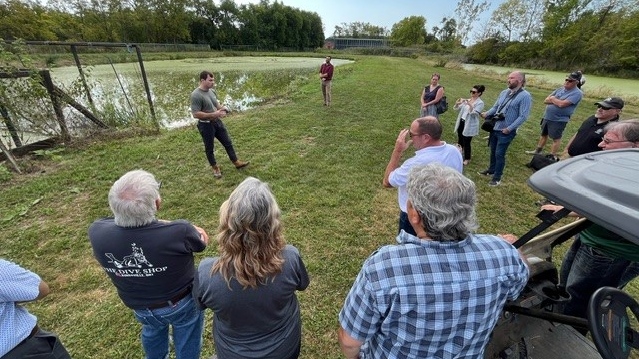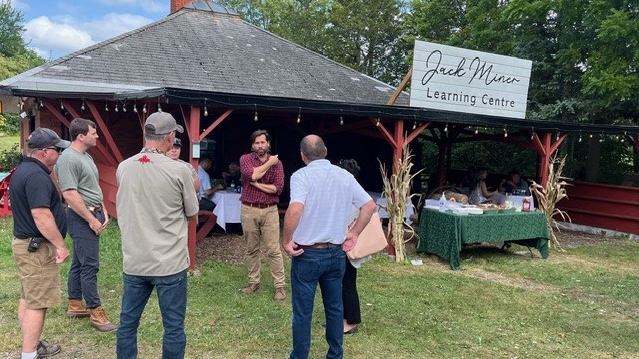Jack Miner Migratory Bird Sanctuary advances bird banding practice
The Jack Miner Migratory Bird Sanctuary in Kingsville has been given clearance to study ducks and geese with use of GPS transmitter technology.
Officials said the upgraded bird banding practice launches the non-profit organization into the 21st century, more than 115 years after Jack Miner banded his first duck.
“Jack, a pioneer of bird banding, was one of the earliest people to tag birds for scientific investigation. After banding his first duck in 1909, Jack tagged well over 100,000 ducks and geese, which carry his legacy with them,” said Matthew Olewski, executive director of The Jack Miner Bird Foundation.
“This project not only brings the sanctuary’s bird banding practices into the 21st century, but it also honours Jack’s conservation legacy to better understand and protect waterfowl.”
Combining Essex County's unique position as a migratory bird hub and a global leader in greenhouse farming, the project, “Movement Ecology of Waterfowl in Response to Landscape Changes”, explores how artificial light affects the behaviour and movement of two important local waterfowl species: the Mallard duck and Canada goose.
 Crowds gather to learn more about bird banding in Kingsville, Ont. on Sept. 18, 2024. (Chris Campbell/CTV News Windsor)
Crowds gather to learn more about bird banding in Kingsville, Ont. on Sept. 18, 2024. (Chris Campbell/CTV News Windsor)
Using GPS tags that record fine-scale movement behaviour and upload data in real-time to the local cell-phone tower networks, the team—consisting of researchers from the University of Windsor, the Jack Miner Bird Sanctuary (JMBS), and 50 Ducks—will examine how and why two waterfowl species interact with current greenhouse installations and whether previous behavioural patterns change as new installations occur.
"Our transmitters are going to relay data to us on the minute and we will know exactly where our ducks and where our geese are flying, resting, nesting and migrating," Olewski explained. "So, it'll allow us to have a better sense of how human activity impacts wildlife."
"We're careful to select migratory birds," he continued. "Not all birds are migratory. Some birds are local. So, it's really important for us to understand when that window of migration occurs in the fall and in the spring, and then to act accordingly."
Initial approval of the project takes the team through 2025, with a goal of banding 50 migratory birds before the end of this year. Officials hope to share early findings with the public online by Oct. 1.
"We do hope, in honour of Jack, that we do something about that data,” Olewski added.
“So, regardless of the outcome of how light pollution impacts migratory patterns, we want to make sure that we're making the best decision that we can to coexist with wildlife and habitat the most responsible decisions that we can make moving forward. The only way that we can do that is by collecting new knowledge. This project does exactly that for us.”
Georgia-based 50 Ducks CEO, Greer Smith, told CTV News the partnership has been a long time coming, noting the group is eager to share the new data with schools across North America.
"Jack Miner was our first and our founding partner, so it's really special," Smith said.
"To get this project off the ground and try and make a difference in early childhood education, early childhood development and to spread the knowledge and the magic that is waterfowl migration to thousands of children who will never be able to come here and who might live in the city, who don't get to experience the magic that is nature… To make it tangible for kids everywhere, it means a lot and it's super rewarding to be able to get it off the ground."
 Jack Miner Learning Centre in Kingsville, Ont. at the bird banding event on Sept. 18, 2024. (Chris Campbell/CTV News Windsor)
Jack Miner Learning Centre in Kingsville, Ont. at the bird banding event on Sept. 18, 2024. (Chris Campbell/CTV News Windsor)
Smith said each GPS tracker is provided by 50 Ducks and cost about $1,600 Canadian, with plans to fundraise for more over the next two years.
"We're going to take all of this data, simplify it, put some lipstick on it, make it super cool for kids and for the general public with some with some data restrictions so you can't see exactly where the duck is, of course, because that would put undue stress on them,” Smith said.
“But it’s more than anyone else in the world is doing and we're going to give it to the world. I hope that we can get more people in more places to care about waterfowl and wetlands. We think we can be in 5,000 classrooms in five years."
CTVNews.ca Top Stories

Prime Minister Trudeau meets Donald Trump at Mar-a-Lago
Prime Minister Justin Trudeau landed in West Palm Beach, Fla., on Friday evening to meet with U.S.-president elect Donald Trump at Mar-a-Lago, sources confirm to CTV News.
'Mayday! Mayday! Mayday!': Details emerge in Boeing 737 incident at Montreal airport
New details suggest that there were communication issues between the pilots of a charter flight and the control tower at Montreal's Mirabel airport when a Boeing 737 made an emergency landing on Wednesday.
Hit man offered $100,000 to kill Montreal crime reporter covering his trial
Political leaders and press freedom groups on Friday were left shell-shocked after Montreal news outlet La Presse revealed that a hit man had offered $100,000 to have one of its crime reporters assassinated.
Questrade lays off undisclosed number of employees
Questrade Financial Group Inc. says it has laid off an undisclosed number of employees to better fit its business strategy.
Cucumbers sold in Ontario, other provinces recalled over possible salmonella contamination
A U.S. company is recalling cucumbers sold in Ontario and other Canadian provinces due to possible salmonella contamination.
Billboard apologizes to Taylor Swift for video snafu
Billboard put together a video of some of Swift's achievements and used a clip from Kanye West's music video for the song 'Famous.'
Musk joins Trump and family for Thanksgiving at Mar-a-Lago
Elon Musk had a seat at the family table for Thanksgiving dinner at Mar-a-Lago, joining President-elect Donald Trump, Melania Trump and their 18-year-old son.
John Herdman resigns as head coach of Toronto FC
John Herdman, embroiled in the drone-spying scandal that has dogged Canada Soccer, has resigned as coach of Toronto FC.
Weekend weather: Parts of Canada could see up to 50 centimetres of snow, wind chills of -40
Winter is less than a month away, but parts of Canada are already projected to see winter-like weather.


































